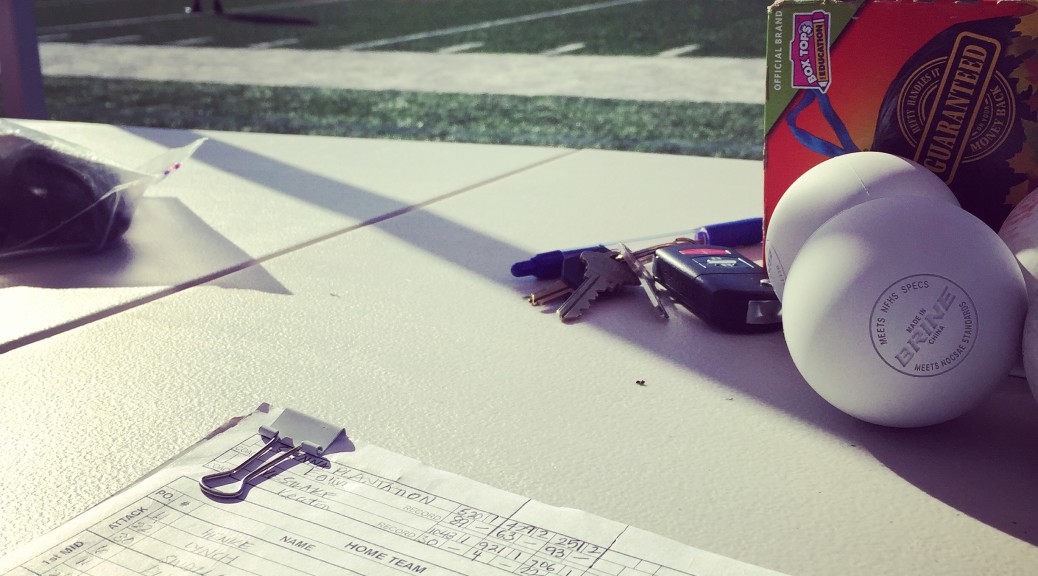Would you walk into a library and start talking loudly on the phone? What if the referee started loudly cheering for your opponent during a game?
In our first game of this season, the parent volunteer from the opposing team arrived and asked, “Do you have a spotter for me?” We were caught off guard by the question and responded that it wasn’t typical for the home team to provide a spotter for the visiting team.
She seemed offended, and it got worse from there. Throughout the game, she yelled directly at the officials and repeatedly interrupted our scoreboard operator, penalty clock keeper, and spotter. The weather was terrible – wind gusts were blowing our things off the table — and at times I could not even hear our own spotter, who was new to the role and needed silence to get accustomed to the job. These conditions caused us to have a highly stressful first game.
Not to mention how poorly she represented her program. This is where the real damage is done.
I’ve noticed since moving to Texas that the visiting team’s volunteers are almost always unaware of the processes, rules, and etiquette of the table. They arrive with incomplete or nonexistent rosters, or with players listed in the wrong order. They cheer loudly and unapologetically, have loud conversations, argue with the home team’s volunteers, don’t set their cell phones to silent, talk to their coaches mid-game… after 3 years of keeping the scorebook here, I’ve seen it all.
If you’re keeping the book for the visiting team, you are a guest and shouldn’t say a single word to anyone about the management of the game. Ask your questions before the game or during breaks, and make notes to discuss later, but do not interfere with the game management. This can be difficult, especially if the game is being mismanaged by the home team or the officials! But the time to raise issues is NOT during the game.
If you’re new to any of the scoring table jobs for your own team – first, thank you for volunteering! The table is truly the best seat in the stadium, but there are some tradeoffs. When you’re sitting at the scoring table, you’re a member of the officiating crew. Your job is to be a silent and neutral extension of the officiating squad. You’re not a parent, not a cheerleader, and definitely not a coach.
If you can’t control yourself and want to cheer, or are sitting on the team side of the field so that you can be close to your child during the game, you should be sitting in the stands.
At the table, understand that you have one job and should only do that job. If you’re keeping the penalty clock, don’t concern yourself with the scoreboard or the book. If you’re keeping the book, restrain yourself from interfering with clock management. (I had to remind myself to do this when the ref asked the table a clock question, and I answered incorrectly – it wasn’t my question to answer in the first place.)
Train yourself not to talk unless you’re fulfilling your own role. If another member of your crew needs help, they will ask. This is especially true for the spotter – don’t help the spotter unless they ask you to. The person recording the statistics is listening to every word the spotter says, and has to process and record the information quickly. If that information comes from the wrong place, confusion always ensues.
Sportsmanship extends to the table and leaves a permanent impression. It’s important that whether you’re home or away, you follow the processes and understand the roles so that you represent your team and community well.
There’s no scoring table etiquette manual out there, but I’ll write one now that I know we all need one. There is an official NCAA manual for statisticians and spotters. Read it, learn it, revisit it often.
Quick Guide to Scoring Table Etiquette
- The table crew’s primary responsibility is to record the events in the game.
- Table area is neutral zone.
- Home and visiting table crews work with each other to keep accurate stats.
- Referees and table crew work as a TEAM. The refs officiate the game while table crews record player stats and ref calls/rulings. Hence, prior to game, introduce yourselves to referees and opponent’s table crew.
- Discuss with refs what they need from you and what you need from them.
- Discuss with all members of the table crew your stat recording capabilities and pre-determine sharing of common stats (i.e., GBs, shots, etc.).
- In any situation where a stat question arises, it is crucial that the statisticians of both teams discuss the situation so that both teams’ statistics are in sync. If the two statisticians cannot come to a mutually-agreed upon conclusion, the decision of the home statistician prevails.
- Keep your eyes, ears and conversation in the table area focused on the events on the field. You can only record what you observe.
